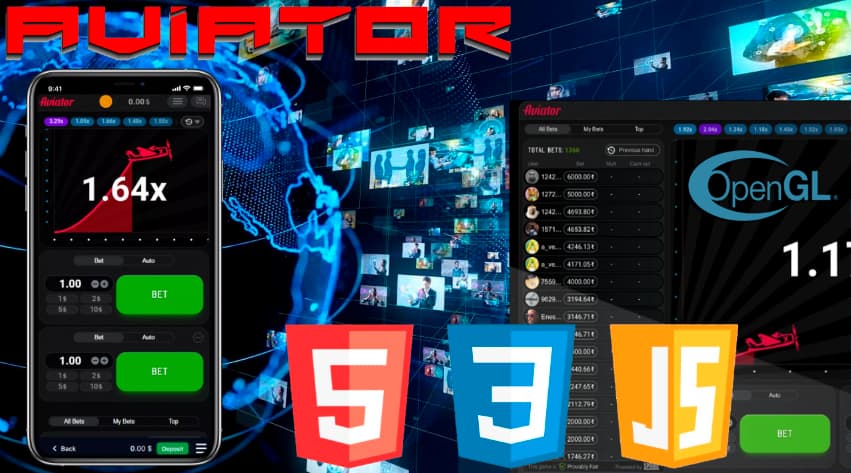Discover how modern web technologies enable the creation of high-quality games like Aviator, providing a seamless experience across devices, with tips on development and benefits.
The contemporary internet has emerged as a strong foundation for developing and delivering flawless quality games like those for desktop and native OS environments. An example of such a game is the Aviator created by Spribe, which demonstrates the capabilities of the web to deliver gaming experiences that are interesting and flowing at the same time. The article will discuss the types of games that can be made using web technologies, HTML game platform basic ingredients, and business advantages to developers with a focus on Aviator-game.in.
Core Technologies of the Web Gaming Platform
Modern web technologies form the backbone of today’s web gaming platform. This section will detail the key technologies that enable high-quality game development on the web, with examples from the Aviator game.
Audio Technologies
The Web Audio API plays a crucial role in providing high-quality audio experiences for web games. Highlight its capabilities in sound synthesis and manipulation, as seen in Aviator’s sound effects.
Graphics and Visuals
WebGL (OpenGL ES 2.0) and the <canvas> element are essential for creating 2D and 3D graphics. These technologies enhance visual performance and user experience, with Aviator’s engaging interface as an example.
Input Methods
Modern input technologies like touch events, the Gamepad API, and advanced sensors make web games more interactive and user-friendly. Aviator uses simple touch-and-click inputs for gameplay.
Programming Languages and Tools
JavaScript is central to web game development. Tools like Emscripten can compile C/C++ code to JavaScript for enhanced performance. Aviator leverages JavaScript’s efficient coding practices for a smooth gaming experience.
Networking and Storage
WebRTC and WebSockets enable real-time communication, and IndexedDB supports local data storage, which is crucial for real-time data handling and server communication in games like Aviator.
Business Benefits of Web-Based Games
Beyond technology, the web offers significant business advantages for game developers. This section will explore the reasons why targeting the web can be beneficial for individual developers and large studios alike, using Aviator as a case study.
Wide Reach and Accessibility
The web’s ubiquitous presence across various devices like smartphones, tablets, PCs, and Smart TVs highlights how this broad reach can increase the potential audience for web games, as evidenced by Aviator’s support on multiple devices and operating systems.
Marketing and Discoverability
Web games can be marketed and discovered more easily compared to traditional app stores. The web’s linking ability and shareability can significantly enhance discoverability, as seen in Aviator’s successful marketing strategy.
Control Over Payments and Updates
Web games offer developers the flexibility to set payment methods and prices. Updates can be made without needing external approval, ensuring a seamless user experience similar to how Aviator updates are rolled out.
Direct Customer Engagement
Web games allow direct customer relationships, without intermediary platforms. Aviator’s in-game chat feature demonstrates the benefits of direct feedback and personalized customer service.
Key Web APIs for Game Development
Modern web APIs provide powerful tools for game developers. This section will provide an overview of essential APIs that make web-based game development feasible and efficient, with references to Aviator’s implementation.
Fetch API
The Fetch API allows for data transmission between the game and web servers, enabling features like level downloads and status updates, similar to how Aviator handles game state synchronization.
Full Screen and Pointer Lock APIs
The Full Screen API and Pointer Lock API enhance user experiences by providing immersive gameplay and precise control in games requiring detailed input. These APIs are utilized in the Aviator gaming experience.
WebSockets and WebRTC

WebSockets enable real-time data transmission in multiplayer games, while WebRTC facilitates in-game communication between players, both crucial for Aviator’s real-time interaction features.
Web Workers
Web Workers allow for background processing in games, using multicore processors for improved performance. This enhances gameplay in Aviator by handling intensive tasks efficiently.
Typed Arrays and WebGL
Javascript Typed Arrays are useful in manipulating binary data, such as high-performance graphics for games like Aviator.
Developing for the Future: Trends and Opportunities
The web-based game development is witnessing the rise of new opportunities and trends thanks to advancements made in web technologies. This part will attempt to give a glimpse of what the future holds for online gaming, basing it on the Aviator game.
Progressive Web Apps (PWAs)
Aviator is an example of a PWA that offers a better gaming experience by allowing offline access and providing performance similar to that of native applications.
Cross-Platform Development
Games that work across different devices and platforms save time and cost, just like the Aviator which can be played through multiple devices.
Virtual and Augmented Reality
For instance, web technologies are making VR and AR experiences possible, leading to immersive gaming such as Aviator could embrace this technology to improve its offering going forward.
In conclusion, modern web technologies have revolutionized gaming, presenting developers with an effective platform for developing quality, user-friendly games. Spribe’s game titled Aviator is one illustration of what can be achieved using online-based games, ranging from technological capabilities to business benefits.
